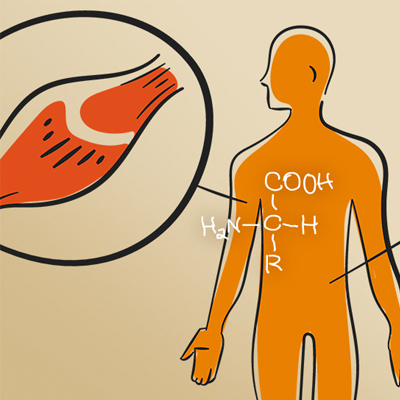Metabolism
All information about "Metabolism" and the related magazine articles can be found here.
Our articles are written clearly and link to scientific studies where relevant. This is how we meet our own standards: we regularly deliver new, high-quality content for you—free of charge, no sign-up required, with the highest possible benefit to you.

Vitamin B12 - what it is and how to recognise a deficiency
Vitamin B12 is an important vitamin that can only be obtained from certain foods. Find out which processes the body needs it for and how to make sure you get enough.

What are amino acids?

What are B vitamins - and what does the body need them for?
B vitamins are needed by the body to maintain vital functions. You can find out exactly what tasks they perform and how to recognise a deficiency here.

Ashwagandha Power Smoothie
For an energising start to the day. Just put all the ingredients in the blender and drink!

He who researches, finds
How can the SARS-CoV-2 virus be stopped? A team from the Charité Berlin and the University of Bonn has found a possible answer to this question in the field of nutritional supplements.

Fruity Red Currant Smoothie
Get a delicious summer beauty boost with our Red Currant Smoothie. Just put all the ingredients in the blender and drink!

It's never too early to learn!
Many people suffer from spring fever in the spring. Or is it just superstition? Find out what the phenomenon is all about.

How do phagocytes help us?
Bacteria, viruses and other pathogens are on the menu for these immune guardians. Here we explain exactly what they do.

What are medicinal mushrooms?
If you want to find out how to get the best out of medicinal mushrooms with alcohol, you've come to the right place. We don't have any recipes for white wine sauce, but we do have the most important information about these natural remedies.

What causes morning sickness?
As if being pregnant wasn't stressful enough, many women experience morning sickness. Here we explain why it happens and what you can do about it.

Who we are

vitaworld in new splendour
Understanding your metabolism: What you need to know to optimize it
Have you ever wondered why some people seem to stay slim effortlessly, while others constantly struggle with their weight? Or why you feel energized after certain meals and just tired after others? The key to these mysteries may lie in your metabolism!
How does the metabolism in our body work?
Metabolism, also known as metabolism, comprises all the biochemical processes in our body that are necessary to generate, store and use energy [1]. It is important because it supports vital functions such as respiration, digestion, cell repair and growth.
It consists of two main processes: anabolic (building up) and catabolic (breaking down) energy metabolism. In anabolic metabolism, molecules are built up and energy is stored, while catabolic metabolism breaks down larger molecules into smaller ones to release energy [3,4]. These processes take place continuously, even when we sleep.
What factors influence the metabolism?
Energy metabolism is influenced by various factors, including age, gender, genetics, muscle mass, hormonal balance and lifestyle factors such as diet and physical activity. With increasing age, energy metabolism tends to decrease, while muscle mass and physical activity can have a reverse effect [2].
Can you really speed up your metabolism?
Yes, the biochemical processes can be accelerated by various measures. Regular physical activity, especially strength training, can promote muscle building, stimulate fat burning and effectively increase the basal metabolic rate. Certain foods and spices such as green tea, hot peppers and protein-rich foods can also cause a small increase in fat metabolism by activating enzymes that support the breakdown of carbohydrates [2]. L-carnitine, for example, can support fat burning.
Which foods promote a healthy metabolism?
Foods that are rich in protein, fiber and healthy fats promote a healthy metabolism. These include [2]:
- Lean meat such as chicken and turkey
- Fish such as salmon and mackerel, eggs
- Nuts such as almonds and walnuts
- Seeds such as chia seeds and linseed
- Whole grain products
- A variety of fruit and vegetables
How does exercise affect the metabolism?
Exercise, especially intensive training and strength training, increases energy expenditure both during exercise and during rest periods afterwards. Regular physical activity helps to build muscle mass, which increases basal metabolic rate and boosts energy metabolism in the long term [2]. Aerobic exercises such as running, swimming or cycling are also effective in improving energy metabolism [2].
What are the most common metabolic disorders and their symptoms?
Zu den häufigsten Stoffwechselstörungen gehören [5,6,7]:
- Hypothyroidism (underactive thyroid gland): Symptoms may include fatigue, weight gain, sensitivity to cold and depression.
- Hyperthyroidism (overactive thyroid): Symptoms include weight loss, nervousness, excessive sweating and palpitations.
- Diabetes mellitus: symptoms include increased thirst, frequent urination, tiredness and blurred vision. Here you can find out what diabetics should not eat.
- Metabolic syndrome: symptoms include obesity, high blood pressure, high blood sugar levels and high cholesterol levels.
If a metabolic disorder leads to obesity, this can cause a number of secondary diseases, including osteoarthritis. Osteoarthritis is a joint disease caused by the breakdown of cartilage.
Did you know that the trace element selenium can regulate thyroid hormones as an important antioxidant? Find out more about it here,
How do hormones influence the metabolism?
Hormones such as insulin, thyroxine, cortisol and adrenaline play a central role in the regulation of metabolism [8]. Insulin regulates blood sugar levels and promotes the uptake of glucose into the cells. Thyroxine influences energy consumption and the body's basal metabolic rate. Cortisol, also known as the stress hormone, regulates sugar and fat metabolism and can slow down energy metabolism if it is chronically elevated. Adrenaline, also known as the fight or flight hormone, mobilizes energy reserves and temporarily increases energy expenditure [2].
Vitamins can also play a role. You can find out more about vitamin B6 and its influence on processes in the body here.
What role does the metabolism play in weight loss?
Energy metabolism determines how many calories the body burns at rest and during activity. A higher metabolism means that the body uses energy more efficiently and burns more calories, which helps with weight loss. Food intake and exercise are key strategies to optimize biochemical processes and support weight loss. A balanced diet with a moderate calorie deficit and regular exercise is crucial for successful long-term weight loss [2].
Which myths about metabolism are widespread?
A common myth is that people with a slow metabolism cannot lose weight. In fact, food intake and exercise play a greater role than the individual's metabolism.
Another myth is that small, frequent meals can greatly boost a poor metabolism, although the effect on overall metabolism is minimal. Instead, the quality and composition of food, as well as the total amount of calories consumed, is crucial for metabolic health and weight management [2].
While certain foods and activities can slightly increase energy metabolism in the short term, the effect is often minimal and not long-term. The basal metabolic rate is mainly determined by factors such as muscle mass, age and gender.
Which metabolic type am I?
The classification into different metabolic types is an approach that attempts to explain individual differences in energy consumption and energy metabolism. People respond differently to diet and exercise, partly due to genetic factors. Some tend to gain weight easily, while others tend to stay lean, regardless of their diet. Metabolic type can influence how efficiently the body utilizes nutrients and burns energy. Although this typing is not always clear-cut and individual variations are large, it can help to adapt personal diet and fitness strategies to achieve health goals [2].
There are various approaches to classifying metabolic types, but no universally recognized typology exists. The classification into specific metabolic types is scientifically controversial and not clearly proven. Although individual metabolic differences exist, they cannot simply be divided into fixed categories. Here are some frequently discussed metabolic types [9]:
- Ectomorph: People of this type tend to be lean and often have difficulty gaining weight. They usually have an active metabolism and burn calories quickly.
- Mesomorph: Mesomorphs are often athletically built, have good muscle definition and can build muscle relatively easily. They often have a balanced metabolic process.
- Endomorphic: Endomorphic types tend to put on fat easily and often have difficulty losing weight. They usually have a slower metabolism.
- Metabolic types based on food reactions: Some classifications are based on how the body reacts to different foods. For example, people may react differently to high carbohydrate, high protein or high fat diets, which affects their metabolic type.
- Genetic and hormonal differences: Some approaches consider genetic and hormonal factors that may cause impaired metabolism, such as insulin sensitivity, thyroid function and other hormonal regulation [2]. Genetic factors play a role, but lifestyle factors such as diet and exercise often have a greater influence.
It is important to note that metabolic types are often a mixture of different characteristics and are not clearly delineated. Determining an individual's metabolic type can therefore be a complex matter and often requires an individualized approach, taking into account various factors such as genetics, lifestyle, dietary habits and physical activity [2].
Guide to determining your metabolic type and how to use it
Self-observation and analysis
Start by observing your physical reactions to different diets and activity levels. Note how you feel after certain meals - whether you have quick energy or feel tired, how long the feeling of fullness lasts and how your body reacts to different types of physical activity.
Take genetic influences into account
Find out about family predispositions regarding energy metabolism and weight regulation. People in the same family often tend to have similar metabolic patterns, which can give clues to your own metabolic types.
Professional support
Consult a nutritionist or endocrinologist for a personalized metabolic analysis. You can have tests performed that measure metabolic parameters such as resting metabolic rate and responses to specific foods to more accurately determine your individual metabolic type.
Adaptation of diet and lifestyle
Based on your observations and the results of the tests, you adjust your diet and exercise patterns. For example, if you find that you respond well to high-carbohydrate meals and feel energized after protein meals, you can adjust your diet accordingly. Similarly, you can optimize your exercise program by choosing activities that match your metabolic types - be it intense training or gentler forms of exercise [2].
Long-term monitoring and adjustment
Energy metabolism can change over the course of a lifetime, influenced by age, hormone levels, lifestyle and other factors. Stay alert to changes and adjust your strategies accordingly to support your long-term health goals [2].
By having your energy metabolism analyzed and adjusting your diet and lifestyle accordingly, you can make more targeted decisions that promote your health and well-being [2].
At a glance
A well-functioning metabolic process is crucial for health and well-being. You can support and optimize your metabolism through targeted measures:
- regular exercise
- a balanced diet
- Minimization of stress
By consciously addressing the factors that influence metabolism and incorporating healthy habits into your daily life, you can not only better control your weight, but also increase your energy and improve your quality of life [2].
Sources
[1] https://flexikon.doccheck.com/de/Stoffwechsel
[2] https://www.ncbi.nlm.nih.gov/pmc/articles/PMC6019055/
[3] https://studyflix.de/biologie/katabolismus-2621
[4] https://flexikon.doccheck.com/de/Anabolismus
[5] https://www.deutsches-schilddruesenzentrum.de/wissenswertes/schilddruesenerkrankungen/
[6] https://www.bundesgesundheitsministerium.de/themen/praevention/gesundheitsgefahren/diabetes
[7] https://www.internisten-im-netz.de/krankheiten/metabolisches-syndrom/was-ist-ein-metabolisches-syndrom/
[8] https://blog.ksb.ch/wissen/die-wichtigsten-hormone/
[9] https://www.focus.de/gesundheit/ernaehrung/sind-sie-ekto-meso-oder-endomorph-der-stoffwechsel-entscheidet-darum-nehmen-manche-menschen-einfach-nicht-ab_id_125536560.html

